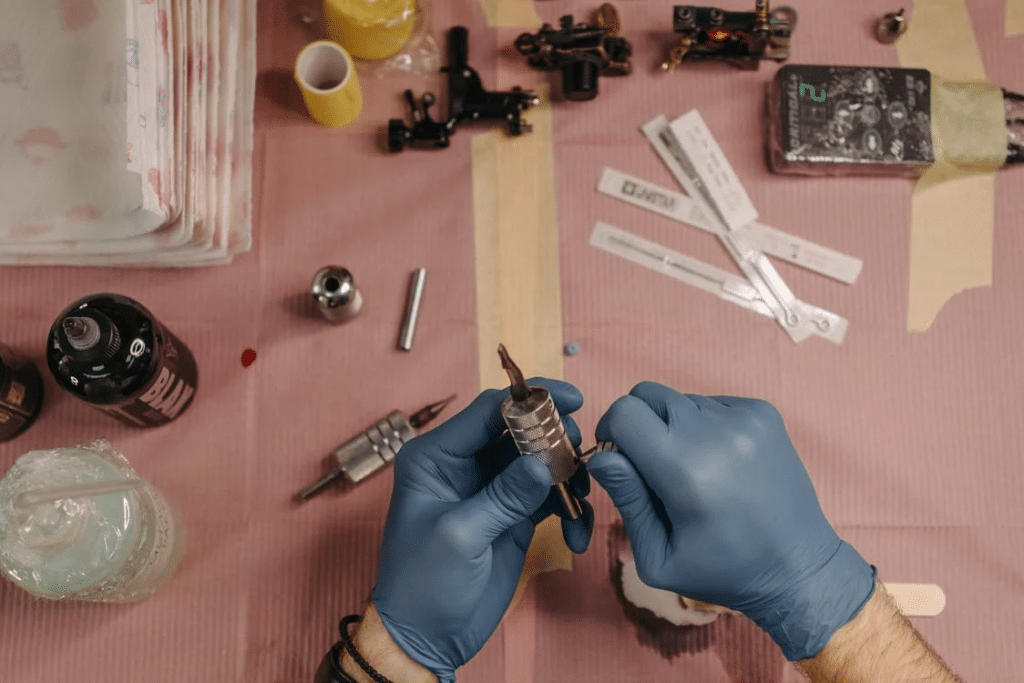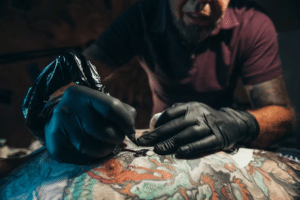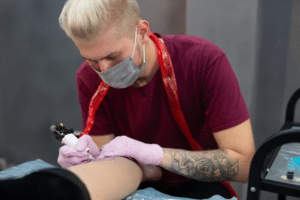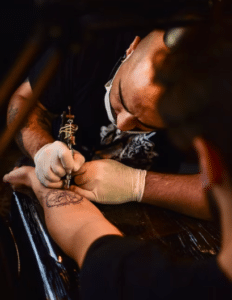
Source: pexels.com
It’s not recommended to get a tattoo while pregnant, according to experts, but there are no definite answers in textbooks. A tattoo is not recommended during pregnancy or while breastfeeding by most dermatology and OB experts. Why? There’s just too much risk involved. There is an increased risk of infection associated with getting a tattoo while pregnant. In addition, getting tattooed can increase your risk of contracting hepatitis B, HIV, and other infections (if your tattoo artist uses unsafe tattooing protocols or sterilisation procedures), which is particularly dangerous if you are pregnant.
Risk of Infection
Tattoos carry a high risk of infection, whether you are pregnant or not. It is estimated that between 0.5 and 6 percent of people who get tattoos develop an infection afterwards. If you have an infection, you may need medication.
Pregnant women are more likely to get an infection from tattoos than those who are not. Tattoos can cause an infection as low as 0.5%, according to studies. This should be even lower in parlours that are licensed and regulated. It is important to note that, although this rate is relatively low, any infection during pregnancy – and any medication to alleviate the infection – can potentially have an adverse effect on the foetus.
Infection risks can be reduced by following safety and hygiene guidelines. Inks may contain microcontaminants, for example, which may cause a reaction in some people.
An open wound is more prone to infection when it is fresh. There is a higher risk of infection in people with weakened immune systems.
Risk of Bloodborne Disease
Infected blood on needles that have not been sterilised or properly cleaned can spread Hepatitis B and C, as well as HIV and AIDS. Viral diseases can be transmitted through bodily fluids, and these are just a few examples. Consequently, you can get infected if a dirty needle is used on you during a tattoo. Besides infectious endocarditis, an infection that affects the heart valves, tattoos have been associated with a rare but very dangerous bloodborne infection known as infectious endocarditis. There is a possibility that either condition will be passed on to the child by a pregnant woman.
Unsafe Dyes
Inflammatory reactions can occur when tattoo dye components are present, especially near the tattooed area. Minerals give dyes their colours, and different dyes contain different minerals. Different tattoo dyes cause different reactions in the body.
It is possible to be more uncomfortable during pregnancy if you have a skin reaction.
Pregnancy and breastfeeding are not recommended for women taking corticosteroids.
The colour of the tattoo seems to be more likely to trigger an allergic reaction than the colour of the tattoo.
Sunlight can also sting, itch, and itch cause pain, swelling, and redness in the tattoo area. This reaction is likely the result of dye ingredients, and the risk varies by the colour of the ink.
A developing baby is also unknown to be affected by tattoo dyes and inks. An adult may be unaffected by small amounts of chemicals, but a foetus can be affected much more severely.
Pain and Stress
During pregnancy, you have a lot going on. It is common knowledge that pregnant women experience lots of strange and wonderful physical and emotional symptoms throughout their pregnancy. It may be difficult for you and your immune system to deal with the physical pain and open wound of tattooing while pregnant.
Epidural
During delivery, an epidural relieves pain through tissue penetration. Epidurals provide pain relief during labour and delivery, but it is unclear whether tattoos on the lower back pose a risk. Although experts are concerned, researchers are working to better understand the risks. It is not advisable to get a tattoo on the lower back area, just to be sure!
Stretch marks
Your first trimester might be the perfect time to get a cool new tattoo. When you’re in the later stages of pregnancy, it may change shape depending on where you get it.
You are bound to get stretch marks–especially around your tummies, thighs, and boobs–which can mess up the designs on your body. You might want to consider this before getting any intricate ink work done during pregnancy, even though it won’t harm the baby.
Safety tips if you get a tattoo while pregnant

Source: pexels.com
Take precautions to make a tattoo procedure as safe as possible if you decide to get one while pregnant despite the risks.
As far as hygiene and infection control are concerned, practices vary greatly. Moreover, tattoo inks aren’t approved by the government since they are considered cosmetics. It’s your responsibility to ensure:
Safety and First Aid
In addition to being registered, the tattoo artist practices safe tattooing methods. The state-by-state requirements vary, but licensure may require a tattoo artist’s training, first aid training, CPR training, and training in bloodborne pathogens. Obtain information about local tattoo regulations from your local health department.
Hygiene
It is important to keep the tattoo studio clean. Your procedure will only be performed with new or sterilised equipment. It is important to use sterile, unopened inks. Heat sterilisation with an autoclave is recommended for non-disposable equipment.
A new pair of gloves must be worn by the artist before beginning the procedure.
Your pregnancy should be disclosed to the artist. By doing so, they can make you as comfortable as possible during the tattooing process.
Aftercare
Make sure your tattoo is well taken care of. Maintain a healthy balance between cleansing and moisturising. While it’s healing, stay out of the sun and avoid swimming. You should follow any other instructions you receive, and you should contact your healthcare provider if you suspect an infection. Symptoms such as redness or swelling after a few days, fever or rash around the tattoo should be examined by a doctor. Keep an eye on the symptoms of infection that might affect you.
Get a Henna Instead
Henna tattoos are applied to the belly during the final trimester in some cultures. During the four-week period following application, henna leaves stains on the skin. A major problem with black henna is that it contains para-phenylenediamine, which can cause skin damage. In some cases, blisters and scarring can result as a result of para-phenylenediamine.
It is safe to get henna tattoos during pregnancy. However, the henna should not be black.
Conclusion
Pregnant women shouldn’t get tattoos because there aren’t enough studies to confirm that they’re safe.
The risks of complications can be minimised with precautions, but infections and other complications cannot be avoided. When you are pregnant, you should speak with your doctor about getting a tattoo. If you want to be sure, you can wait until you give birth before getting inked.




